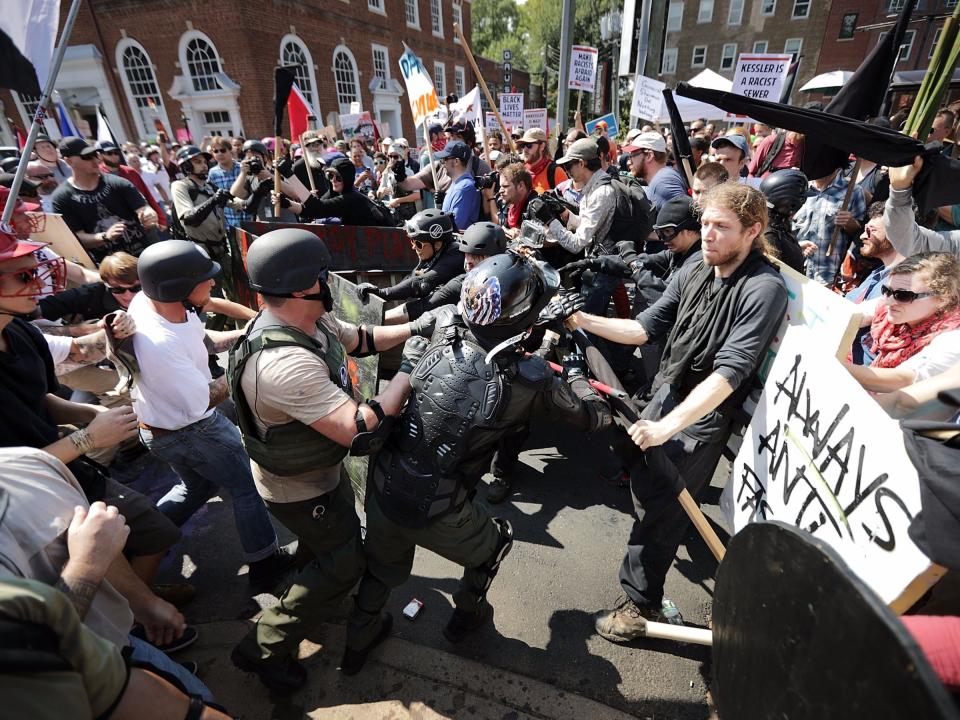Charlottesville is a tipping point in Silicon Valley's approach to hate speech

(Photo by Chip Somodevilla/Getty Images)
Silicon Valley is finally cracking down on white supremacists.
Firms like Twitter, Spotify, chat app Discord, and even famously anti-censorship Cloudflare are taking action against racists and neo-Nazis on their platforms, following this weekend's deadly white supremacist violence in Charlottesville, Virginia.
It's a significant change of heart for the tech industry, which has historically positioned itself as pro-"free speech." But the rally led to a collective reassessment of the responsibilities of tech companies for the content they host and support.
Here's a (non-comprehensive) sample of the action taken by tech businesses over the last week:
GoDaddy, a web-hosting service, booted the notorious neo-Nazi website, the Daily Stormer, off its platform. The site moved to Google — which promptly ejected it too.
Apple's payment service Apple Pay is cutting off white supremacists, disabling payment support for websites that sell racist and neo-Nazi apparel, BuzzFeed News reported.
Twitter suspended accounts associated with the Daily Stormer.
Facebook, which already has rules in place banning "hate speech" (unlike Twitter), banned accounts (on Facebook and Instagram) of at least one white nationalist who attended the rally. "It's a disgrace that we still need to say that neo-Nazis and white supremacists are wrong — as if this is somehow not obvious," CEO Mark Zuckerberg said.
Discord, a chat platform that has been popular with the racist "alt-right" movement, cracked down on hate groups and shut down an alt-right server.
Spotify moved to remove "hate bands" from its music streaming service, telling Reuters: "Illegal content or material that favors hatred or incites violence against race, religion, sexuality or the like is not tolerated by us."
Cloudflare, a service that protects websites from DDoS cyber-attacks, stopped protecting the Daily Stormer — despite its previous commitments to be totally neutral as to the content it guards.
Domain registrar and hosting service Squarespace has ditched white nationalist customers including Richard Spencer.
Payment service Paypal has pledged to stop supporting hate websites, while fundraising platform GoFundMe is pulling fundraisers for the suspect in the Charlottesville vehicle attack.
Silicon Valley has traditionally been laissez-faire when it comes to material which, while potentially distasteful or incredibly racist or sexist, isn't explicitly illegal in the United States.
Alexis Ohanian, cofounder of Reddit, once described the social news and discussion site as "a bastion of free speech on the World Wide Web." In 2012, Tony Wang — then-general manager of Twitter in the UK — said Twitter viewed itself as "the free speech wing of the free speech party."
But over the last few years, a quiet revolution has been underway, as companies struggle to reconcile these commitments with their moral aversion to racism and attempts to prevent harassment. Twitter has increasingly banned far-right accounts, while Reddit has cracked down on some of its more controversial subreddits, including the racist community "c**ntown", "FatPeopleHate," and conspiracy-theory peddling "PizzaGate."
Then over the weekend, hundreds of racists and neo-Nazis rallied in Charlottesville, with violent clashes culminating in a white supremacist ramming their vehicle into a crowd of anti-racist counterprotestors, killing one and injuring more than a dozen.

Chip Somodevilla/Getty ImagesWhile Donald Trump has come under heavy criticism for trying to equate neo-Nazis with anti-racist counter-protestors, the tech industry has moved to cut off access for racists.
In an email to employees, Apple CEO Tim Cook directly criticised the president, and wrote: "Regardless of your political views, we must all stand together on this one point — that we are all equal. As a company, through our actions, our products and our voice, we will always work to ensure that everyone is treated equally and with respect."
As such, Charlottesville has the potential to be a tipping point in how Silicon Valley views its responsibilities towards civil society — and how it juggles the conflicting demands of free speech and protecting its users from hate speech.
But this shift brings new risks. The episode has highlighted the power of single companies to decide whether to take businesses offline — something not everyone is happy with.
Matthew Prince, CEO of Cloudflare, expressed concerns even as his company removed the Daily Stormer as a customer — meaning the white supremacist site was immediately knocked out by cyber-atatcks."The ability of somebody to single-handedly choose to knock content offline doesn't align with core ideas of due process or justice," he told Business Insider.
NOW WATCH: We drop tested both the new and old Nokia 3310 – and there was a clear winner
See Also:

 Yahoo News
Yahoo News 

